PGBM143 - The Role of Strategic Alliances & M&As in Global Strategy
VerifiedAdded on 2023/06/13
|22
|6358
|137
Essay
AI Summary
This essay critically evaluates the role of strategic alliances (SAs) and mergers and acquisitions (M&As) in helping multinational corporations (MNCs) like Vodafone Group Plc achieve and sustain corporate profitability within the context of global strategy and international trade. It explores the theoretical underpinnings of global corporate strategies, analyzes the strategic decision-making processes that enable organizations to interact with the global business environment, and examines the impact of these strategies on Vodafone's performance, considering factors such as market expansion, competitive advantage, and financial performance. The essay also discusses the challenges and opportunities associated with SAs and M&As, including implementation complexities, cultural integration, and potential risks, while referencing specific examples and research to support its arguments.
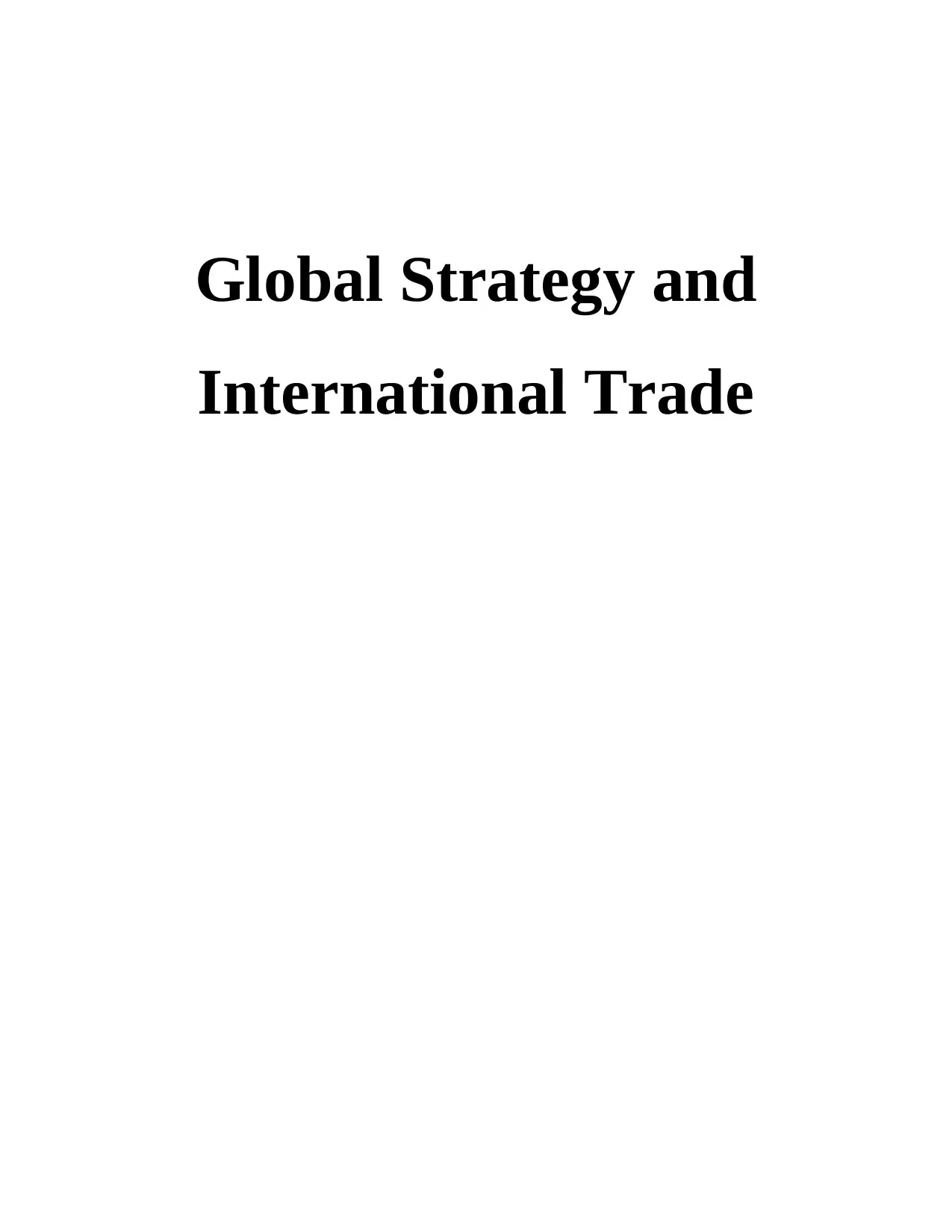
Global Strategy and
International Trade
International Trade
Paraphrase This Document
Need a fresh take? Get an instant paraphrase of this document with our AI Paraphraser

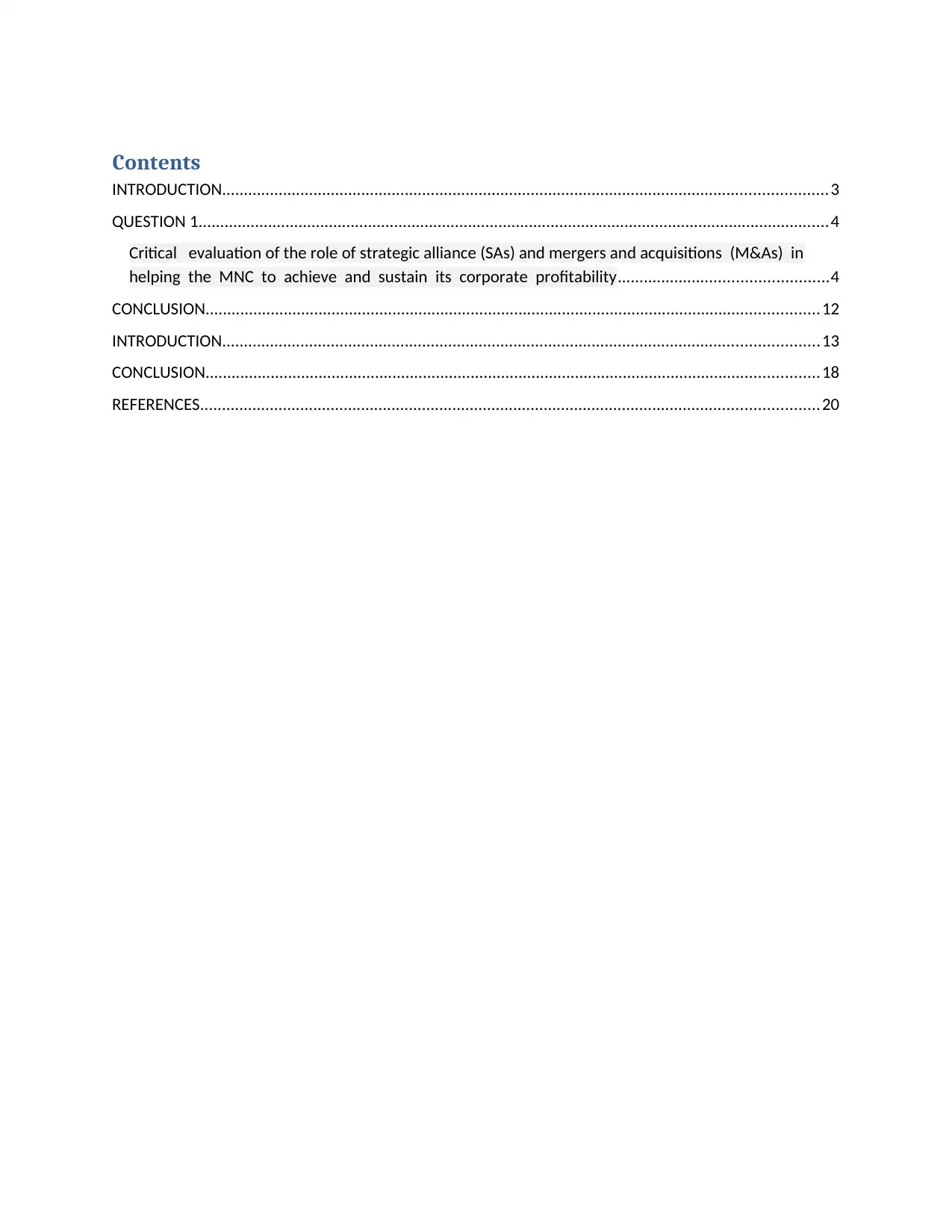
Contents
INTRODUCTION...........................................................................................................................................3
QUESTION 1.................................................................................................................................................4
Critical evaluation of the role of strategic alliance (SAs) and mergers and acquisitions (M&As) in
helping the MNC to achieve and sustain its corporate profitability................................................4
CONCLUSION.............................................................................................................................................12
INTRODUCTION.........................................................................................................................................13
CONCLUSION.............................................................................................................................................18
REFERENCES..............................................................................................................................................20
INTRODUCTION...........................................................................................................................................3
QUESTION 1.................................................................................................................................................4
Critical evaluation of the role of strategic alliance (SAs) and mergers and acquisitions (M&As) in
helping the MNC to achieve and sustain its corporate profitability................................................4
CONCLUSION.............................................................................................................................................12
INTRODUCTION.........................................................................................................................................13
CONCLUSION.............................................................................................................................................18
REFERENCES..............................................................................................................................................20
⊘ This is a preview!⊘
Do you want full access?
Subscribe today to unlock all pages.

Trusted by 1+ million students worldwide
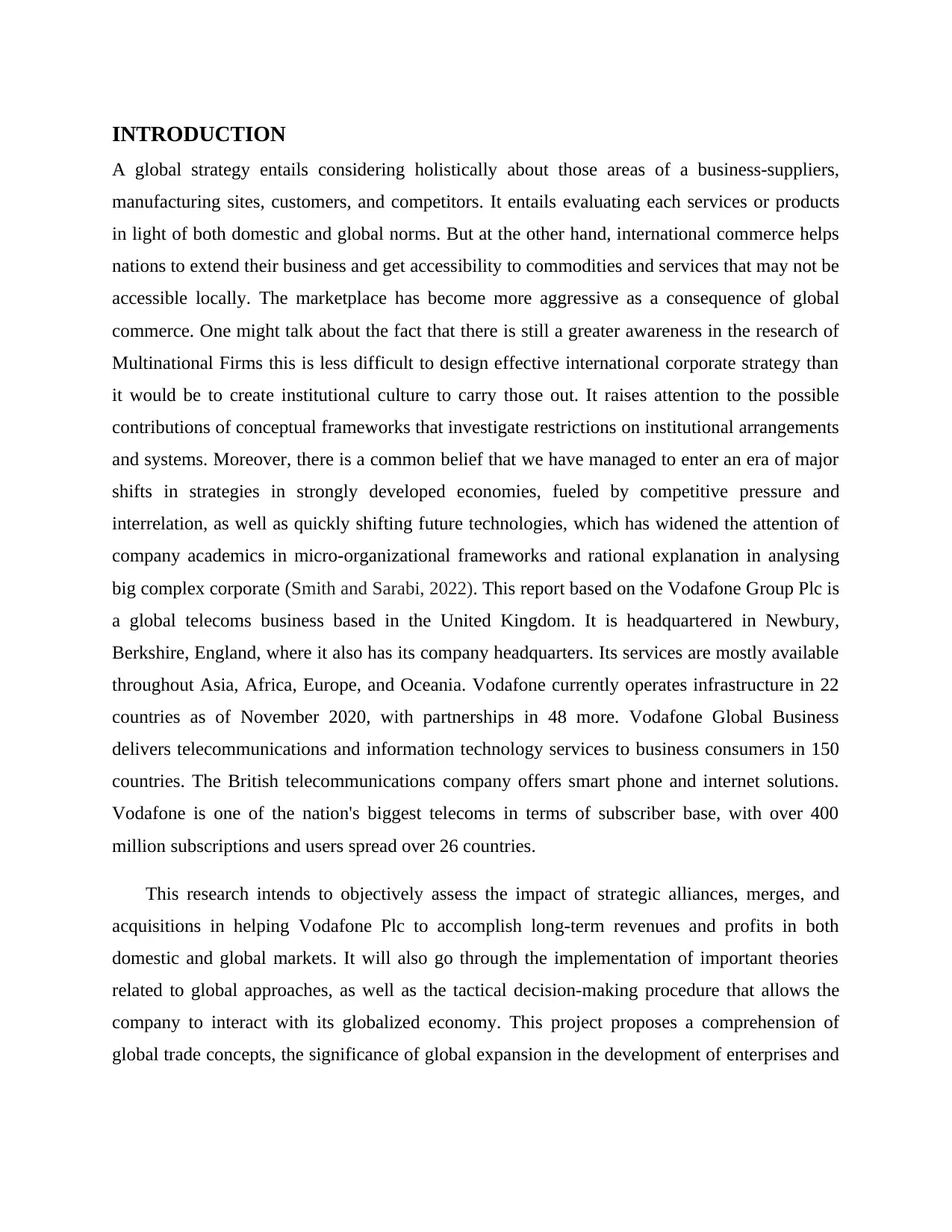
INTRODUCTION
A global strategy entails considering holistically about those areas of a business-suppliers,
manufacturing sites, customers, and competitors. It entails evaluating each services or products
in light of both domestic and global norms. But at the other hand, international commerce helps
nations to extend their business and get accessibility to commodities and services that may not be
accessible locally. The marketplace has become more aggressive as a consequence of global
commerce. One might talk about the fact that there is still a greater awareness in the research of
Multinational Firms this is less difficult to design effective international corporate strategy than
it would be to create institutional culture to carry those out. It raises attention to the possible
contributions of conceptual frameworks that investigate restrictions on institutional arrangements
and systems. Moreover, there is a common belief that we have managed to enter an era of major
shifts in strategies in strongly developed economies, fueled by competitive pressure and
interrelation, as well as quickly shifting future technologies, which has widened the attention of
company academics in micro-organizational frameworks and rational explanation in analysing
big complex corporate (Smith and Sarabi, 2022). This report based on the Vodafone Group Plc is
a global telecoms business based in the United Kingdom. It is headquartered in Newbury,
Berkshire, England, where it also has its company headquarters. Its services are mostly available
throughout Asia, Africa, Europe, and Oceania. Vodafone currently operates infrastructure in 22
countries as of November 2020, with partnerships in 48 more. Vodafone Global Business
delivers telecommunications and information technology services to business consumers in 150
countries. The British telecommunications company offers smart phone and internet solutions.
Vodafone is one of the nation's biggest telecoms in terms of subscriber base, with over 400
million subscriptions and users spread over 26 countries.
This research intends to objectively assess the impact of strategic alliances, merges, and
acquisitions in helping Vodafone Plc to accomplish long-term revenues and profits in both
domestic and global markets. It will also go through the implementation of important theories
related to global approaches, as well as the tactical decision-making procedure that allows the
company to interact with its globalized economy. This project proposes a comprehension of
global trade concepts, the significance of global expansion in the development of enterprises and
A global strategy entails considering holistically about those areas of a business-suppliers,
manufacturing sites, customers, and competitors. It entails evaluating each services or products
in light of both domestic and global norms. But at the other hand, international commerce helps
nations to extend their business and get accessibility to commodities and services that may not be
accessible locally. The marketplace has become more aggressive as a consequence of global
commerce. One might talk about the fact that there is still a greater awareness in the research of
Multinational Firms this is less difficult to design effective international corporate strategy than
it would be to create institutional culture to carry those out. It raises attention to the possible
contributions of conceptual frameworks that investigate restrictions on institutional arrangements
and systems. Moreover, there is a common belief that we have managed to enter an era of major
shifts in strategies in strongly developed economies, fueled by competitive pressure and
interrelation, as well as quickly shifting future technologies, which has widened the attention of
company academics in micro-organizational frameworks and rational explanation in analysing
big complex corporate (Smith and Sarabi, 2022). This report based on the Vodafone Group Plc is
a global telecoms business based in the United Kingdom. It is headquartered in Newbury,
Berkshire, England, where it also has its company headquarters. Its services are mostly available
throughout Asia, Africa, Europe, and Oceania. Vodafone currently operates infrastructure in 22
countries as of November 2020, with partnerships in 48 more. Vodafone Global Business
delivers telecommunications and information technology services to business consumers in 150
countries. The British telecommunications company offers smart phone and internet solutions.
Vodafone is one of the nation's biggest telecoms in terms of subscriber base, with over 400
million subscriptions and users spread over 26 countries.
This research intends to objectively assess the impact of strategic alliances, merges, and
acquisitions in helping Vodafone Plc to accomplish long-term revenues and profits in both
domestic and global markets. It will also go through the implementation of important theories
related to global approaches, as well as the tactical decision-making procedure that allows the
company to interact with its globalized economy. This project proposes a comprehension of
global trade concepts, the significance of global expansion in the development of enterprises and
Paraphrase This Document
Need a fresh take? Get an instant paraphrase of this document with our AI Paraphraser
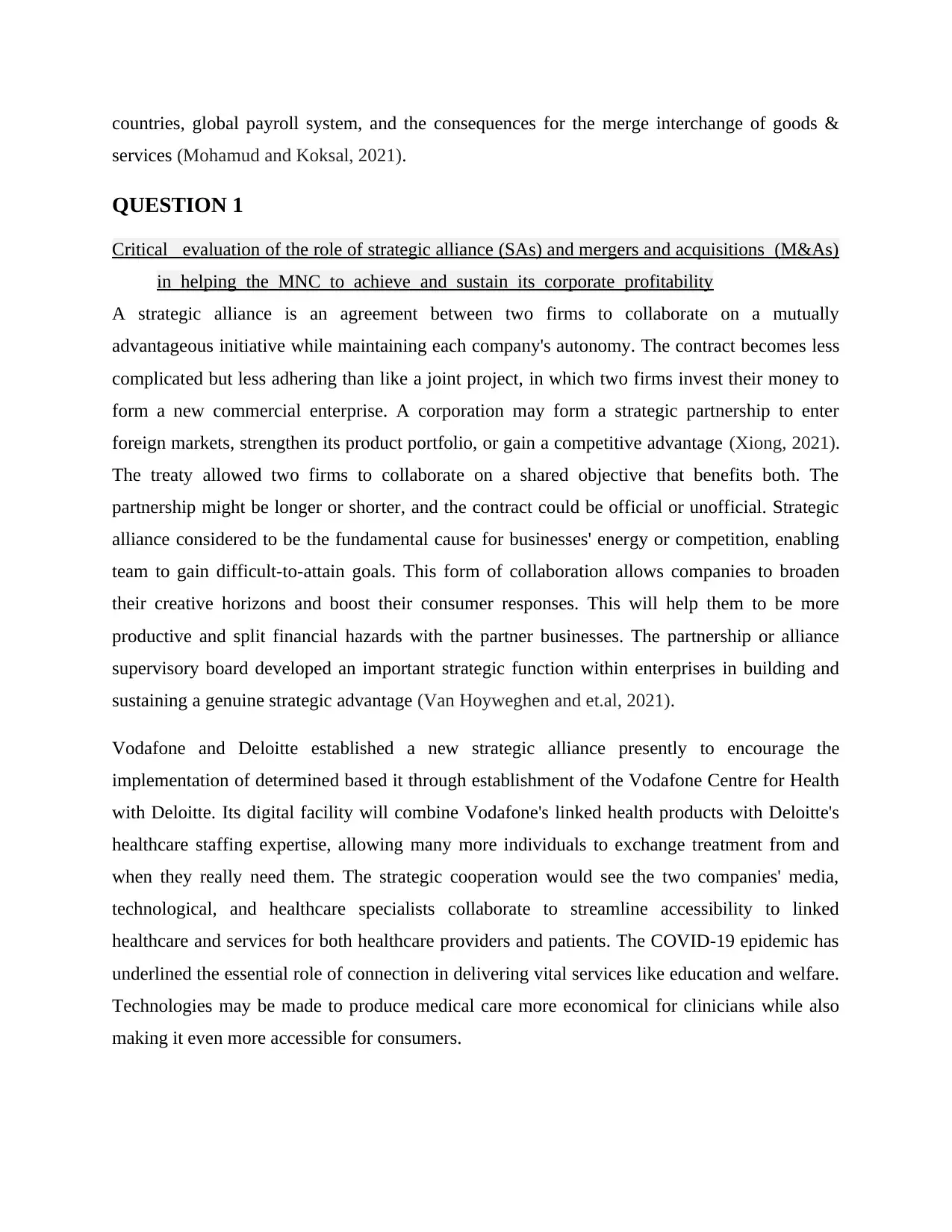
countries, global payroll system, and the consequences for the merge interchange of goods &
services (Mohamud and Koksal, 2021).
QUESTION 1
Critical evaluation of the role of strategic alliance (SAs) and mergers and acquisitions (M&As)
in helping the MNC to achieve and sustain its corporate profitability
A strategic alliance is an agreement between two firms to collaborate on a mutually
advantageous initiative while maintaining each company's autonomy. The contract becomes less
complicated but less adhering than like a joint project, in which two firms invest their money to
form a new commercial enterprise. A corporation may form a strategic partnership to enter
foreign markets, strengthen its product portfolio, or gain a competitive advantage (Xiong, 2021).
The treaty allowed two firms to collaborate on a shared objective that benefits both. The
partnership might be longer or shorter, and the contract could be official or unofficial. Strategic
alliance considered to be the fundamental cause for businesses' energy or competition, enabling
team to gain difficult-to-attain goals. This form of collaboration allows companies to broaden
their creative horizons and boost their consumer responses. This will help them to be more
productive and split financial hazards with the partner businesses. The partnership or alliance
supervisory board developed an important strategic function within enterprises in building and
sustaining a genuine strategic advantage (Van Hoyweghen and et.al, 2021).
Vodafone and Deloitte established a new strategic alliance presently to encourage the
implementation of determined based it through establishment of the Vodafone Centre for Health
with Deloitte. Its digital facility will combine Vodafone's linked health products with Deloitte's
healthcare staffing expertise, allowing many more individuals to exchange treatment from and
when they really need them. The strategic cooperation would see the two companies' media,
technological, and healthcare specialists collaborate to streamline accessibility to linked
healthcare and services for both healthcare providers and patients. The COVID-19 epidemic has
underlined the essential role of connection in delivering vital services like education and welfare.
Technologies may be made to produce medical care more economical for clinicians while also
making it even more accessible for consumers.
services (Mohamud and Koksal, 2021).
QUESTION 1
Critical evaluation of the role of strategic alliance (SAs) and mergers and acquisitions (M&As)
in helping the MNC to achieve and sustain its corporate profitability
A strategic alliance is an agreement between two firms to collaborate on a mutually
advantageous initiative while maintaining each company's autonomy. The contract becomes less
complicated but less adhering than like a joint project, in which two firms invest their money to
form a new commercial enterprise. A corporation may form a strategic partnership to enter
foreign markets, strengthen its product portfolio, or gain a competitive advantage (Xiong, 2021).
The treaty allowed two firms to collaborate on a shared objective that benefits both. The
partnership might be longer or shorter, and the contract could be official or unofficial. Strategic
alliance considered to be the fundamental cause for businesses' energy or competition, enabling
team to gain difficult-to-attain goals. This form of collaboration allows companies to broaden
their creative horizons and boost their consumer responses. This will help them to be more
productive and split financial hazards with the partner businesses. The partnership or alliance
supervisory board developed an important strategic function within enterprises in building and
sustaining a genuine strategic advantage (Van Hoyweghen and et.al, 2021).
Vodafone and Deloitte established a new strategic alliance presently to encourage the
implementation of determined based it through establishment of the Vodafone Centre for Health
with Deloitte. Its digital facility will combine Vodafone's linked health products with Deloitte's
healthcare staffing expertise, allowing many more individuals to exchange treatment from and
when they really need them. The strategic cooperation would see the two companies' media,
technological, and healthcare specialists collaborate to streamline accessibility to linked
healthcare and services for both healthcare providers and patients. The COVID-19 epidemic has
underlined the essential role of connection in delivering vital services like education and welfare.
Technologies may be made to produce medical care more economical for clinicians while also
making it even more accessible for consumers.
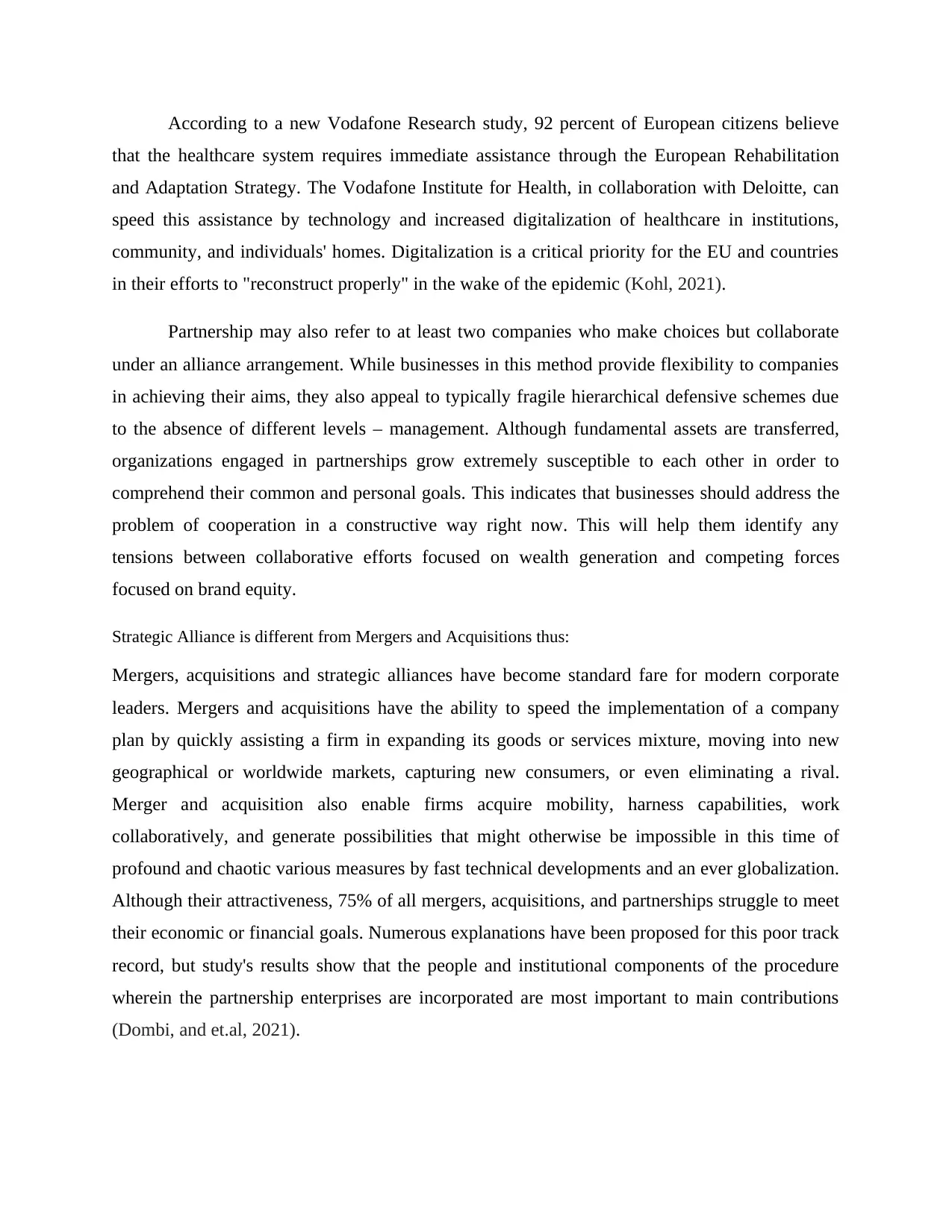
According to a new Vodafone Research study, 92 percent of European citizens believe
that the healthcare system requires immediate assistance through the European Rehabilitation
and Adaptation Strategy. The Vodafone Institute for Health, in collaboration with Deloitte, can
speed this assistance by technology and increased digitalization of healthcare in institutions,
community, and individuals' homes. Digitalization is a critical priority for the EU and countries
in their efforts to "reconstruct properly" in the wake of the epidemic (Kohl, 2021).
Partnership may also refer to at least two companies who make choices but collaborate
under an alliance arrangement. While businesses in this method provide flexibility to companies
in achieving their aims, they also appeal to typically fragile hierarchical defensive schemes due
to the absence of different levels – management. Although fundamental assets are transferred,
organizations engaged in partnerships grow extremely susceptible to each other in order to
comprehend their common and personal goals. This indicates that businesses should address the
problem of cooperation in a constructive way right now. This will help them identify any
tensions between collaborative efforts focused on wealth generation and competing forces
focused on brand equity.
Strategic Alliance is different from Mergers and Acquisitions thus:
Mergers, acquisitions and strategic alliances have become standard fare for modern corporate
leaders. Mergers and acquisitions have the ability to speed the implementation of a company
plan by quickly assisting a firm in expanding its goods or services mixture, moving into new
geographical or worldwide markets, capturing new consumers, or even eliminating a rival.
Merger and acquisition also enable firms acquire mobility, harness capabilities, work
collaboratively, and generate possibilities that might otherwise be impossible in this time of
profound and chaotic various measures by fast technical developments and an ever globalization.
Although their attractiveness, 75% of all mergers, acquisitions, and partnerships struggle to meet
their economic or financial goals. Numerous explanations have been proposed for this poor track
record, but study's results show that the people and institutional components of the procedure
wherein the partnership enterprises are incorporated are most important to main contributions
(Dombi, and et.al, 2021).
that the healthcare system requires immediate assistance through the European Rehabilitation
and Adaptation Strategy. The Vodafone Institute for Health, in collaboration with Deloitte, can
speed this assistance by technology and increased digitalization of healthcare in institutions,
community, and individuals' homes. Digitalization is a critical priority for the EU and countries
in their efforts to "reconstruct properly" in the wake of the epidemic (Kohl, 2021).
Partnership may also refer to at least two companies who make choices but collaborate
under an alliance arrangement. While businesses in this method provide flexibility to companies
in achieving their aims, they also appeal to typically fragile hierarchical defensive schemes due
to the absence of different levels – management. Although fundamental assets are transferred,
organizations engaged in partnerships grow extremely susceptible to each other in order to
comprehend their common and personal goals. This indicates that businesses should address the
problem of cooperation in a constructive way right now. This will help them identify any
tensions between collaborative efforts focused on wealth generation and competing forces
focused on brand equity.
Strategic Alliance is different from Mergers and Acquisitions thus:
Mergers, acquisitions and strategic alliances have become standard fare for modern corporate
leaders. Mergers and acquisitions have the ability to speed the implementation of a company
plan by quickly assisting a firm in expanding its goods or services mixture, moving into new
geographical or worldwide markets, capturing new consumers, or even eliminating a rival.
Merger and acquisition also enable firms acquire mobility, harness capabilities, work
collaboratively, and generate possibilities that might otherwise be impossible in this time of
profound and chaotic various measures by fast technical developments and an ever globalization.
Although their attractiveness, 75% of all mergers, acquisitions, and partnerships struggle to meet
their economic or financial goals. Numerous explanations have been proposed for this poor track
record, but study's results show that the people and institutional components of the procedure
wherein the partnership enterprises are incorporated are most important to main contributions
(Dombi, and et.al, 2021).
⊘ This is a preview!⊘
Do you want full access?
Subscribe today to unlock all pages.

Trusted by 1+ million students worldwide
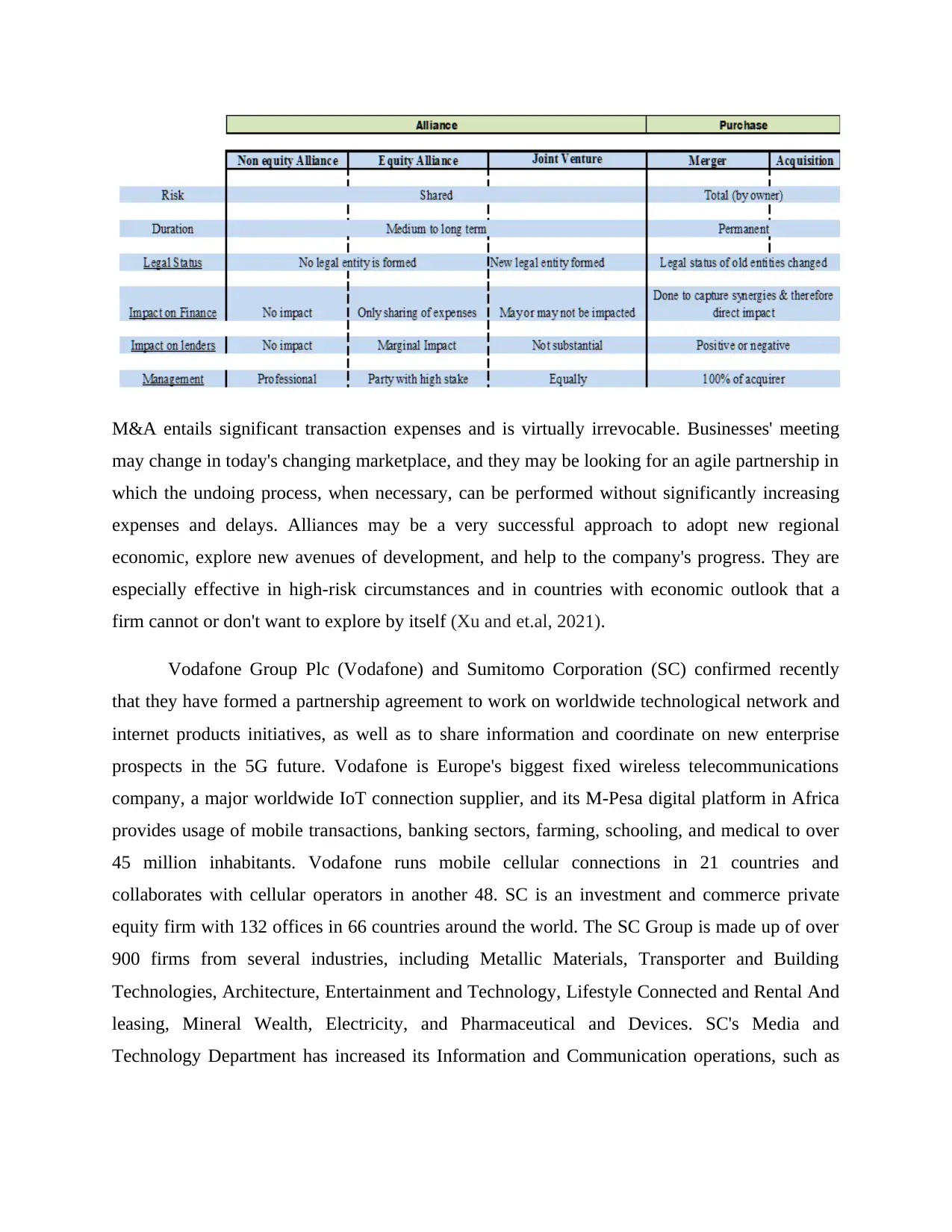
M&A entails significant transaction expenses and is virtually irrevocable. Businesses' meeting
may change in today's changing marketplace, and they may be looking for an agile partnership in
which the undoing process, when necessary, can be performed without significantly increasing
expenses and delays. Alliances may be a very successful approach to adopt new regional
economic, explore new avenues of development, and help to the company's progress. They are
especially effective in high-risk circumstances and in countries with economic outlook that a
firm cannot or don't want to explore by itself (Xu and et.al, 2021).
Vodafone Group Plc (Vodafone) and Sumitomo Corporation (SC) confirmed recently
that they have formed a partnership agreement to work on worldwide technological network and
internet products initiatives, as well as to share information and coordinate on new enterprise
prospects in the 5G future. Vodafone is Europe's biggest fixed wireless telecommunications
company, a major worldwide IoT connection supplier, and its M-Pesa digital platform in Africa
provides usage of mobile transactions, banking sectors, farming, schooling, and medical to over
45 million inhabitants. Vodafone runs mobile cellular connections in 21 countries and
collaborates with cellular operators in another 48. SC is an investment and commerce private
equity firm with 132 offices in 66 countries around the world. The SC Group is made up of over
900 firms from several industries, including Metallic Materials, Transporter and Building
Technologies, Architecture, Entertainment and Technology, Lifestyle Connected and Rental And
leasing, Mineral Wealth, Electricity, and Pharmaceutical and Devices. SC's Media and
Technology Department has increased its Information and Communication operations, such as
may change in today's changing marketplace, and they may be looking for an agile partnership in
which the undoing process, when necessary, can be performed without significantly increasing
expenses and delays. Alliances may be a very successful approach to adopt new regional
economic, explore new avenues of development, and help to the company's progress. They are
especially effective in high-risk circumstances and in countries with economic outlook that a
firm cannot or don't want to explore by itself (Xu and et.al, 2021).
Vodafone Group Plc (Vodafone) and Sumitomo Corporation (SC) confirmed recently
that they have formed a partnership agreement to work on worldwide technological network and
internet products initiatives, as well as to share information and coordinate on new enterprise
prospects in the 5G future. Vodafone is Europe's biggest fixed wireless telecommunications
company, a major worldwide IoT connection supplier, and its M-Pesa digital platform in Africa
provides usage of mobile transactions, banking sectors, farming, schooling, and medical to over
45 million inhabitants. Vodafone runs mobile cellular connections in 21 countries and
collaborates with cellular operators in another 48. SC is an investment and commerce private
equity firm with 132 offices in 66 countries around the world. The SC Group is made up of over
900 firms from several industries, including Metallic Materials, Transporter and Building
Technologies, Architecture, Entertainment and Technology, Lifestyle Connected and Rental And
leasing, Mineral Wealth, Electricity, and Pharmaceutical and Devices. SC's Media and
Technology Department has increased its Information and Communication operations, such as
Paraphrase This Document
Need a fresh take? Get an instant paraphrase of this document with our AI Paraphraser
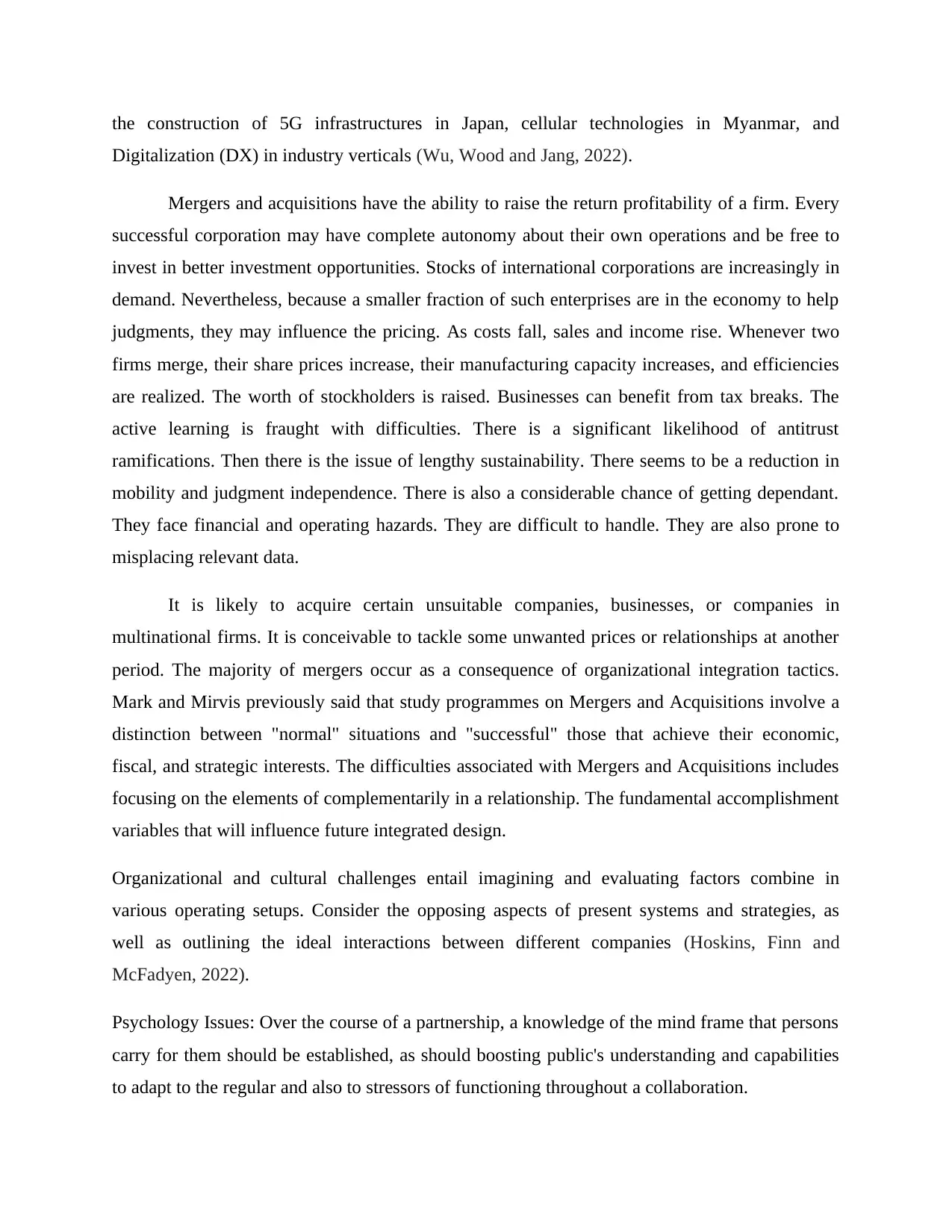
the construction of 5G infrastructures in Japan, cellular technologies in Myanmar, and
Digitalization (DX) in industry verticals (Wu, Wood and Jang, 2022).
Mergers and acquisitions have the ability to raise the return profitability of a firm. Every
successful corporation may have complete autonomy about their own operations and be free to
invest in better investment opportunities. Stocks of international corporations are increasingly in
demand. Nevertheless, because a smaller fraction of such enterprises are in the economy to help
judgments, they may influence the pricing. As costs fall, sales and income rise. Whenever two
firms merge, their share prices increase, their manufacturing capacity increases, and efficiencies
are realized. The worth of stockholders is raised. Businesses can benefit from tax breaks. The
active learning is fraught with difficulties. There is a significant likelihood of antitrust
ramifications. Then there is the issue of lengthy sustainability. There seems to be a reduction in
mobility and judgment independence. There is also a considerable chance of getting dependant.
They face financial and operating hazards. They are difficult to handle. They are also prone to
misplacing relevant data.
It is likely to acquire certain unsuitable companies, businesses, or companies in
multinational firms. It is conceivable to tackle some unwanted prices or relationships at another
period. The majority of mergers occur as a consequence of organizational integration tactics.
Mark and Mirvis previously said that study programmes on Mergers and Acquisitions involve a
distinction between "normal" situations and "successful" those that achieve their economic,
fiscal, and strategic interests. The difficulties associated with Mergers and Acquisitions includes
focusing on the elements of complementarily in a relationship. The fundamental accomplishment
variables that will influence future integrated design.
Organizational and cultural challenges entail imagining and evaluating factors combine in
various operating setups. Consider the opposing aspects of present systems and strategies, as
well as outlining the ideal interactions between different companies (Hoskins, Finn and
McFadyen, 2022).
Psychology Issues: Over the course of a partnership, a knowledge of the mind frame that persons
carry for them should be established, as should boosting public's understanding and capabilities
to adapt to the regular and also to stressors of functioning throughout a collaboration.
Digitalization (DX) in industry verticals (Wu, Wood and Jang, 2022).
Mergers and acquisitions have the ability to raise the return profitability of a firm. Every
successful corporation may have complete autonomy about their own operations and be free to
invest in better investment opportunities. Stocks of international corporations are increasingly in
demand. Nevertheless, because a smaller fraction of such enterprises are in the economy to help
judgments, they may influence the pricing. As costs fall, sales and income rise. Whenever two
firms merge, their share prices increase, their manufacturing capacity increases, and efficiencies
are realized. The worth of stockholders is raised. Businesses can benefit from tax breaks. The
active learning is fraught with difficulties. There is a significant likelihood of antitrust
ramifications. Then there is the issue of lengthy sustainability. There seems to be a reduction in
mobility and judgment independence. There is also a considerable chance of getting dependant.
They face financial and operating hazards. They are difficult to handle. They are also prone to
misplacing relevant data.
It is likely to acquire certain unsuitable companies, businesses, or companies in
multinational firms. It is conceivable to tackle some unwanted prices or relationships at another
period. The majority of mergers occur as a consequence of organizational integration tactics.
Mark and Mirvis previously said that study programmes on Mergers and Acquisitions involve a
distinction between "normal" situations and "successful" those that achieve their economic,
fiscal, and strategic interests. The difficulties associated with Mergers and Acquisitions includes
focusing on the elements of complementarily in a relationship. The fundamental accomplishment
variables that will influence future integrated design.
Organizational and cultural challenges entail imagining and evaluating factors combine in
various operating setups. Consider the opposing aspects of present systems and strategies, as
well as outlining the ideal interactions between different companies (Hoskins, Finn and
McFadyen, 2022).
Psychology Issues: Over the course of a partnership, a knowledge of the mind frame that persons
carry for them should be established, as should boosting public's understanding and capabilities
to adapt to the regular and also to stressors of functioning throughout a collaboration.
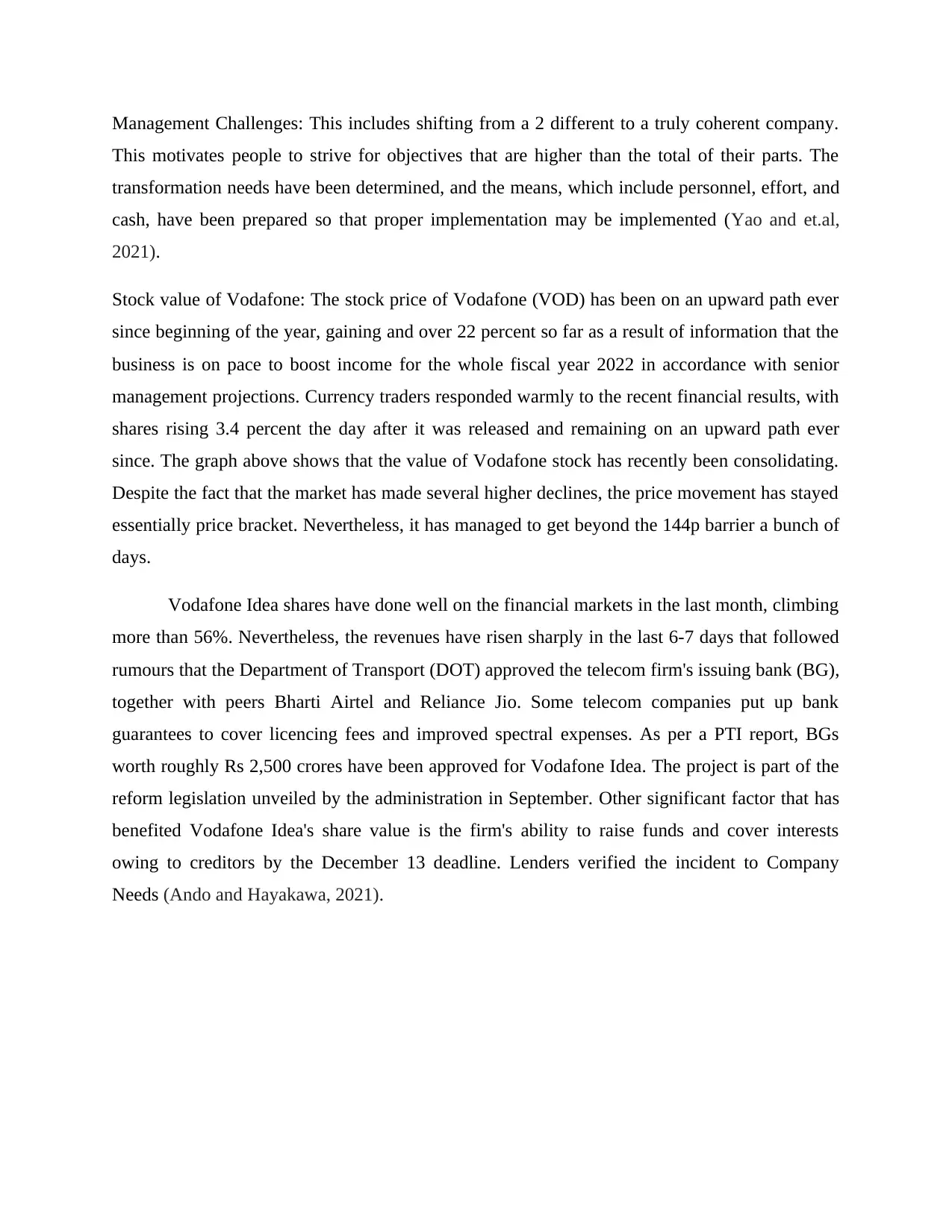
Management Challenges: This includes shifting from a 2 different to a truly coherent company.
This motivates people to strive for objectives that are higher than the total of their parts. The
transformation needs have been determined, and the means, which include personnel, effort, and
cash, have been prepared so that proper implementation may be implemented (Yao and et.al,
2021).
Stock value of Vodafone: The stock price of Vodafone (VOD) has been on an upward path ever
since beginning of the year, gaining and over 22 percent so far as a result of information that the
business is on pace to boost income for the whole fiscal year 2022 in accordance with senior
management projections. Currency traders responded warmly to the recent financial results, with
shares rising 3.4 percent the day after it was released and remaining on an upward path ever
since. The graph above shows that the value of Vodafone stock has recently been consolidating.
Despite the fact that the market has made several higher declines, the price movement has stayed
essentially price bracket. Nevertheless, it has managed to get beyond the 144p barrier a bunch of
days.
Vodafone Idea shares have done well on the financial markets in the last month, climbing
more than 56%. Nevertheless, the revenues have risen sharply in the last 6-7 days that followed
rumours that the Department of Transport (DOT) approved the telecom firm's issuing bank (BG),
together with peers Bharti Airtel and Reliance Jio. Some telecom companies put up bank
guarantees to cover licencing fees and improved spectral expenses. As per a PTI report, BGs
worth roughly Rs 2,500 crores have been approved for Vodafone Idea. The project is part of the
reform legislation unveiled by the administration in September. Other significant factor that has
benefited Vodafone Idea's share value is the firm's ability to raise funds and cover interests
owing to creditors by the December 13 deadline. Lenders verified the incident to Company
Needs (Ando and Hayakawa, 2021).
This motivates people to strive for objectives that are higher than the total of their parts. The
transformation needs have been determined, and the means, which include personnel, effort, and
cash, have been prepared so that proper implementation may be implemented (Yao and et.al,
2021).
Stock value of Vodafone: The stock price of Vodafone (VOD) has been on an upward path ever
since beginning of the year, gaining and over 22 percent so far as a result of information that the
business is on pace to boost income for the whole fiscal year 2022 in accordance with senior
management projections. Currency traders responded warmly to the recent financial results, with
shares rising 3.4 percent the day after it was released and remaining on an upward path ever
since. The graph above shows that the value of Vodafone stock has recently been consolidating.
Despite the fact that the market has made several higher declines, the price movement has stayed
essentially price bracket. Nevertheless, it has managed to get beyond the 144p barrier a bunch of
days.
Vodafone Idea shares have done well on the financial markets in the last month, climbing
more than 56%. Nevertheless, the revenues have risen sharply in the last 6-7 days that followed
rumours that the Department of Transport (DOT) approved the telecom firm's issuing bank (BG),
together with peers Bharti Airtel and Reliance Jio. Some telecom companies put up bank
guarantees to cover licencing fees and improved spectral expenses. As per a PTI report, BGs
worth roughly Rs 2,500 crores have been approved for Vodafone Idea. The project is part of the
reform legislation unveiled by the administration in September. Other significant factor that has
benefited Vodafone Idea's share value is the firm's ability to raise funds and cover interests
owing to creditors by the December 13 deadline. Lenders verified the incident to Company
Needs (Ando and Hayakawa, 2021).
⊘ This is a preview!⊘
Do you want full access?
Subscribe today to unlock all pages.

Trusted by 1+ million students worldwide
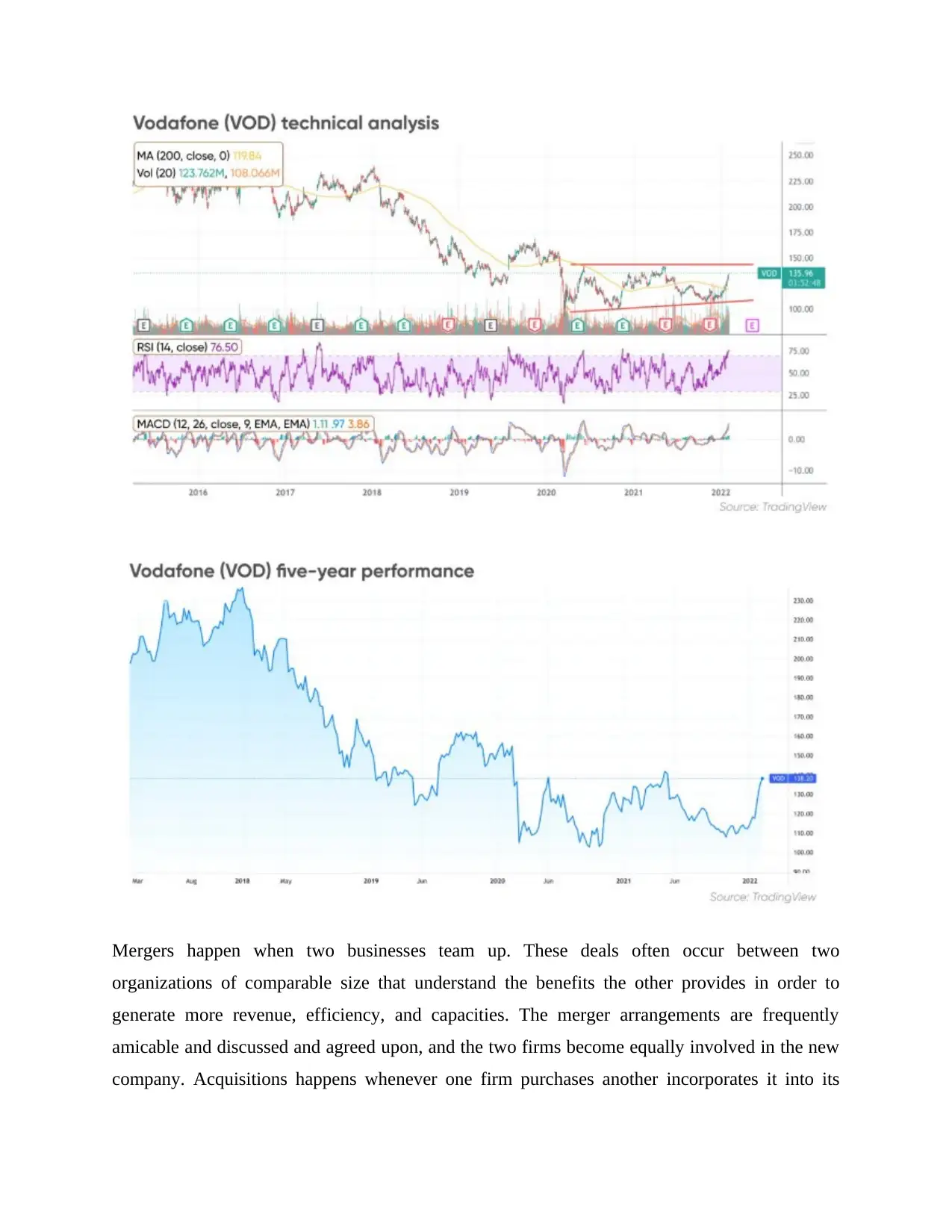
Mergers happen when two businesses team up. These deals often occur between two
organizations of comparable size that understand the benefits the other provides in order to
generate more revenue, efficiency, and capacities. The merger arrangements are frequently
amicable and discussed and agreed upon, and the two firms become equally involved in the new
company. Acquisitions happens whenever one firm purchases another incorporates it into its
organizations of comparable size that understand the benefits the other provides in order to
generate more revenue, efficiency, and capacities. The merger arrangements are frequently
amicable and discussed and agreed upon, and the two firms become equally involved in the new
company. Acquisitions happens whenever one firm purchases another incorporates it into its
Paraphrase This Document
Need a fresh take? Get an instant paraphrase of this document with our AI Paraphraser
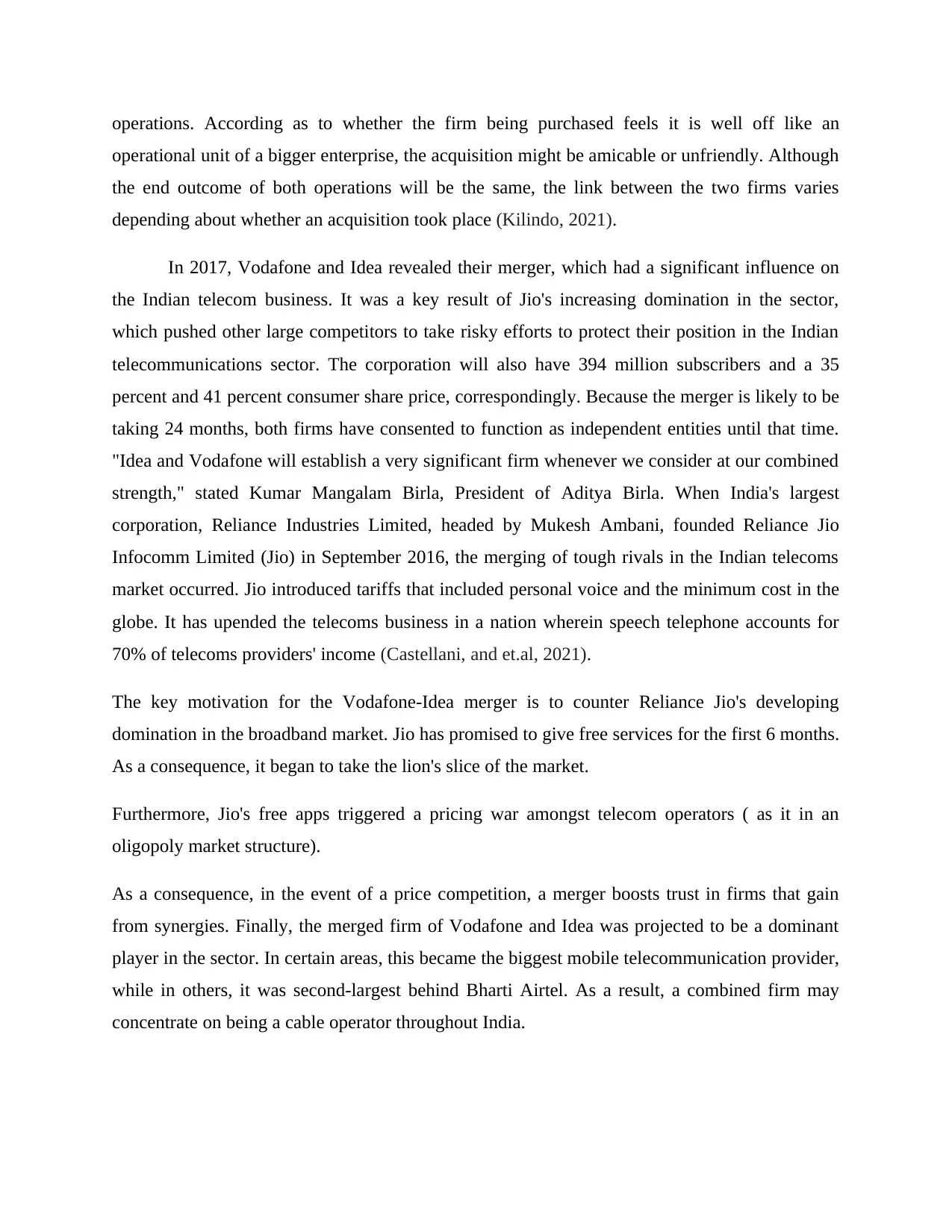
operations. According as to whether the firm being purchased feels it is well off like an
operational unit of a bigger enterprise, the acquisition might be amicable or unfriendly. Although
the end outcome of both operations will be the same, the link between the two firms varies
depending about whether an acquisition took place (Kilindo, 2021).
In 2017, Vodafone and Idea revealed their merger, which had a significant influence on
the Indian telecom business. It was a key result of Jio's increasing domination in the sector,
which pushed other large competitors to take risky efforts to protect their position in the Indian
telecommunications sector. The corporation will also have 394 million subscribers and a 35
percent and 41 percent consumer share price, correspondingly. Because the merger is likely to be
taking 24 months, both firms have consented to function as independent entities until that time.
"Idea and Vodafone will establish a very significant firm whenever we consider at our combined
strength," stated Kumar Mangalam Birla, President of Aditya Birla. When India's largest
corporation, Reliance Industries Limited, headed by Mukesh Ambani, founded Reliance Jio
Infocomm Limited (Jio) in September 2016, the merging of tough rivals in the Indian telecoms
market occurred. Jio introduced tariffs that included personal voice and the minimum cost in the
globe. It has upended the telecoms business in a nation wherein speech telephone accounts for
70% of telecoms providers' income (Castellani, and et.al, 2021).
The key motivation for the Vodafone-Idea merger is to counter Reliance Jio's developing
domination in the broadband market. Jio has promised to give free services for the first 6 months.
As a consequence, it began to take the lion's slice of the market.
Furthermore, Jio's free apps triggered a pricing war amongst telecom operators ( as it in an
oligopoly market structure).
As a consequence, in the event of a price competition, a merger boosts trust in firms that gain
from synergies. Finally, the merged firm of Vodafone and Idea was projected to be a dominant
player in the sector. In certain areas, this became the biggest mobile telecommunication provider,
while in others, it was second-largest behind Bharti Airtel. As a result, a combined firm may
concentrate on being a cable operator throughout India.
operational unit of a bigger enterprise, the acquisition might be amicable or unfriendly. Although
the end outcome of both operations will be the same, the link between the two firms varies
depending about whether an acquisition took place (Kilindo, 2021).
In 2017, Vodafone and Idea revealed their merger, which had a significant influence on
the Indian telecom business. It was a key result of Jio's increasing domination in the sector,
which pushed other large competitors to take risky efforts to protect their position in the Indian
telecommunications sector. The corporation will also have 394 million subscribers and a 35
percent and 41 percent consumer share price, correspondingly. Because the merger is likely to be
taking 24 months, both firms have consented to function as independent entities until that time.
"Idea and Vodafone will establish a very significant firm whenever we consider at our combined
strength," stated Kumar Mangalam Birla, President of Aditya Birla. When India's largest
corporation, Reliance Industries Limited, headed by Mukesh Ambani, founded Reliance Jio
Infocomm Limited (Jio) in September 2016, the merging of tough rivals in the Indian telecoms
market occurred. Jio introduced tariffs that included personal voice and the minimum cost in the
globe. It has upended the telecoms business in a nation wherein speech telephone accounts for
70% of telecoms providers' income (Castellani, and et.al, 2021).
The key motivation for the Vodafone-Idea merger is to counter Reliance Jio's developing
domination in the broadband market. Jio has promised to give free services for the first 6 months.
As a consequence, it began to take the lion's slice of the market.
Furthermore, Jio's free apps triggered a pricing war amongst telecom operators ( as it in an
oligopoly market structure).
As a consequence, in the event of a price competition, a merger boosts trust in firms that gain
from synergies. Finally, the merged firm of Vodafone and Idea was projected to be a dominant
player in the sector. In certain areas, this became the biggest mobile telecommunication provider,
while in others, it was second-largest behind Bharti Airtel. As a result, a combined firm may
concentrate on being a cable operator throughout India.
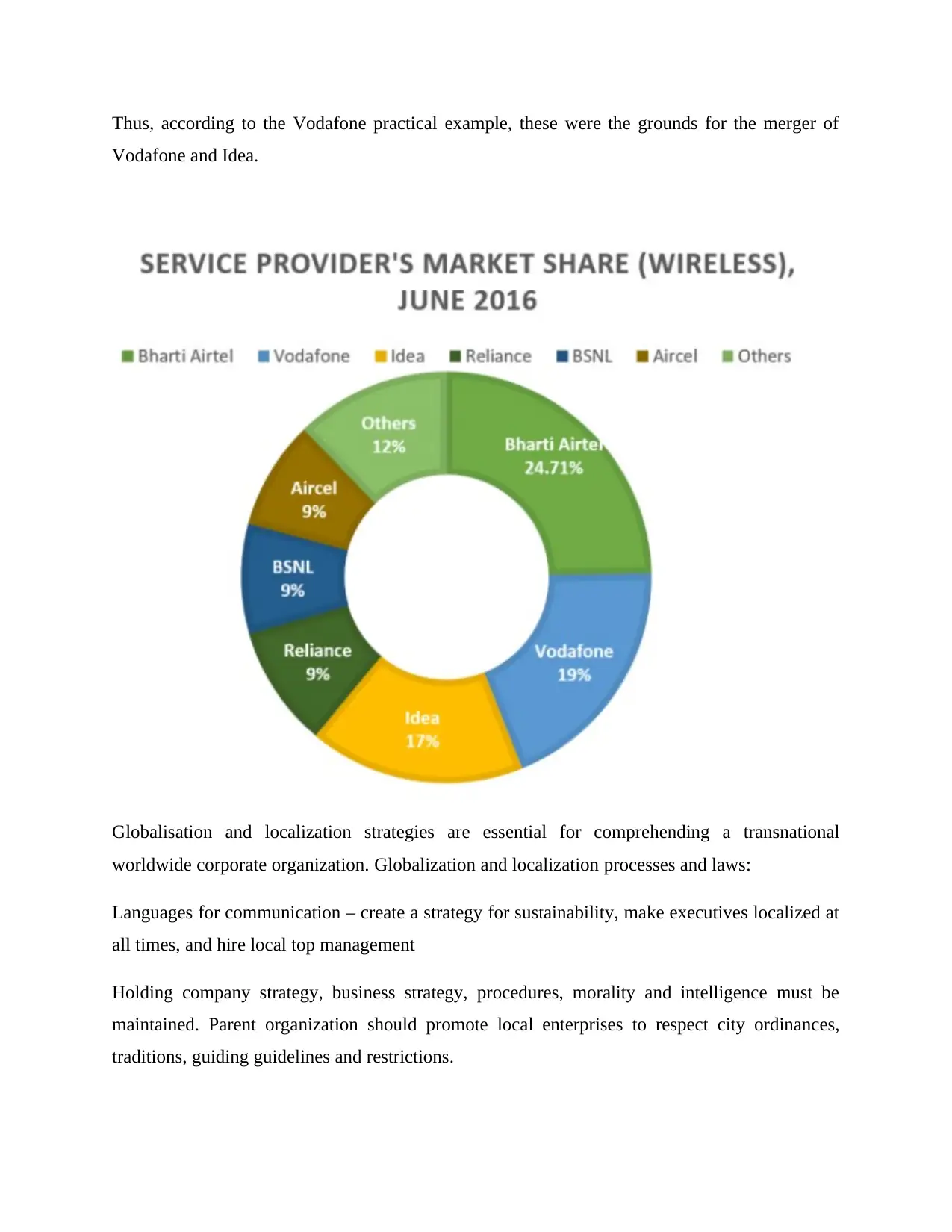
Thus, according to the Vodafone practical example, these were the grounds for the merger of
Vodafone and Idea.
Globalisation and localization strategies are essential for comprehending a transnational
worldwide corporate organization. Globalization and localization processes and laws:
Languages for communication – create a strategy for sustainability, make executives localized at
all times, and hire local top management
Holding company strategy, business strategy, procedures, morality and intelligence must be
maintained. Parent organization should promote local enterprises to respect city ordinances,
traditions, guiding guidelines and restrictions.
Vodafone and Idea.
Globalisation and localization strategies are essential for comprehending a transnational
worldwide corporate organization. Globalization and localization processes and laws:
Languages for communication – create a strategy for sustainability, make executives localized at
all times, and hire local top management
Holding company strategy, business strategy, procedures, morality and intelligence must be
maintained. Parent organization should promote local enterprises to respect city ordinances,
traditions, guiding guidelines and restrictions.
⊘ This is a preview!⊘
Do you want full access?
Subscribe today to unlock all pages.

Trusted by 1+ million students worldwide
1 out of 22
Related Documents
Your All-in-One AI-Powered Toolkit for Academic Success.
+13062052269
info@desklib.com
Available 24*7 on WhatsApp / Email
![[object Object]](/_next/static/media/star-bottom.7253800d.svg)
Unlock your academic potential
Copyright © 2020–2026 A2Z Services. All Rights Reserved. Developed and managed by ZUCOL.




